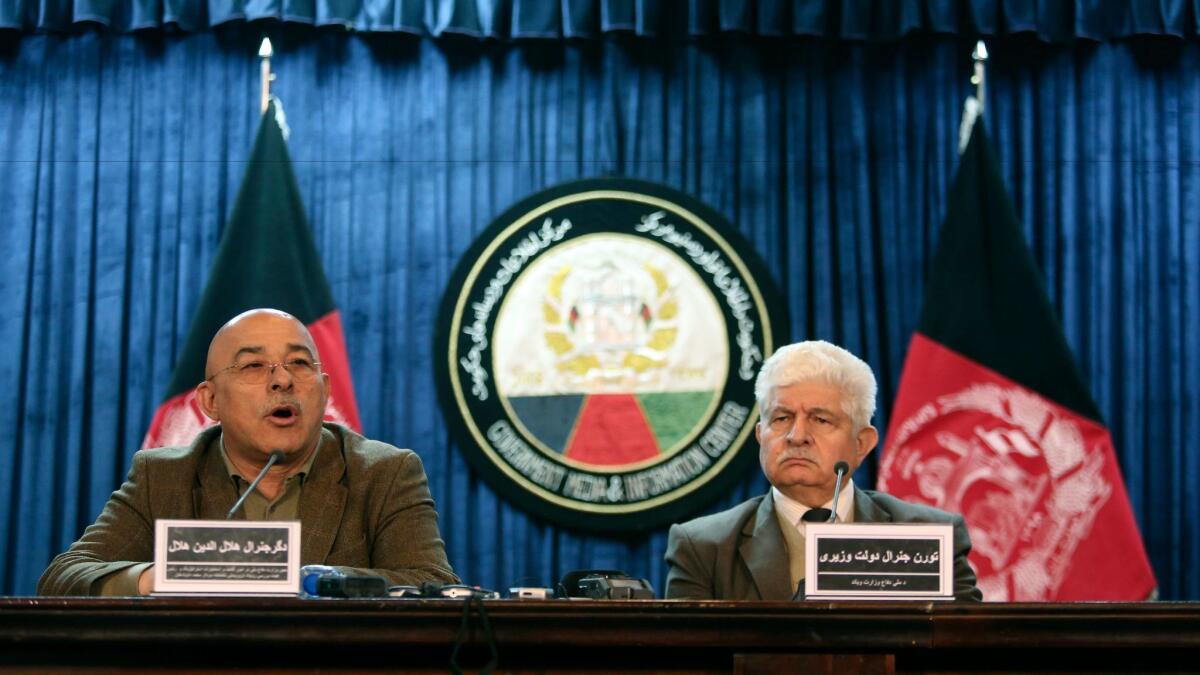As death toll in hospital attack soars to 50, Afghanistan investigates whether it was an inside job

- Share via
Reporting from Kabul, Afghanistan — The Afghan defense ministry said Wednesday that two dozen army personnel have been arrested for questioning following the security breach that allowed four assailants to enter the country’s main military hospital and kill 50 people a week earlier.
Defense officials issued the new death toll — nearly twice as high as what they initially reported — while disclosing that investigators were examining whether hospital staff helped the attackers, who opened fire inside medical wards on March 8 in one of the deadliest attacks in Kabul in recent months.
For the record:
12:44 p.m. Jan. 23, 2025An earlier version of this article identified a lawmaker from Paktika province as Nader Khan Katawazi. He is Nader Khan Katawazai.
The Afghan security establishment has been facing intense criticism in the wake of the devastating assault against the country’s largest military hospital, which treats officers, soldiers, their families and senior government officials.
Lt. Gen. Helaludin Helal, deputy defense minister for strategic affairs, told a news conference that the gunmen rode in a vehicle with fake license plates that was allowed to enter Sardar Mohammad Dawood Khan military hospital because of “the negligence of the personnel at the gate.”
One detonated a suicide bomb while three others — dressed in lab coats to impersonate medical personnel — attacked doctors, hospital staff and patients with firearms, grenades and knives. Approximately 50 people were killed and 31 wounded, Helal said.
Survivors and lawmakers have raised questions about how the assailants were able to breach the heavily guarded compound and move through the multistory building with a familiarity that suggested detailed planning or — to some — collusion from hospital staff.
There is no doubt that some top officials of the hospital were linked with the attackers.
— Jawed Kohistani, Afghanistan security analyst
A senior surgeon who escaped the attack unhurt said in an interview that two hospital interns had collaborated with the assailants, although he did not provide details, saying the defense ministry had told him not to speak to the media.
The attackers “knew every clue about the hospital roads and buildings,” said the surgeon, who requested anonymity to protect his job. “I think [the interns] drew a map for the other attackers to carry out the carnage easily.”
Islamic State claimed responsibility within hours of the attack, but over the past week some Afghan officials have raised doubts about the claim. Abdullah Abdullah, the Afghan government’s chief executive, told a meeting of senior officials this week that Taliban militants are “the main reason” for such incidents.
A police official said a preliminary investigation had shown that the hand grenades used by the assailants were already inside the hospital.
“We found out that two boxes full of hand grenades were brought into the hospital building by unknown individuals,” said the official, who spoke on condition of anonymity due to the sensitivity of the issue.
The official also said the attackers’ vehicle had a hospital entry pass bearing the signature of the defense minister and they had obtained weapons from soldiers guarding the gate. It was not clear whether the gate pass had been forged or how the weapons were taken.
Analysts and some Afghan lawmakers have been scathing in their criticism of the security breach at the 400-bed hospital.
“It was a well-planned attack,” said Jawed Kohistani, an independent security analyst, who blamed an intelligence failure by the top military brass who run the hospital and are supposed to gather intelligence on threats.
“There is no doubt that some top officials of the hospital were linked with the attackers,” Kohistani said.
Others blamed a culture of corruption for allowing militants to infiltrate the departments responsible for Afghan security, as happened during a spate of so-called insider attacks several years ago, when Afghan soldiers and police opened fire on U.S. and international troops they were serving with.
“If members of parliament really want security in the country, then they should protect the security departments from powerful individuals,” said Nader Khan Katawazai, a lawmaker from the eastern province of Paktika.
Afghan defense officials admit they struggle to meet the demands of securing the large hospital, which has some 2,000 personnel and recruits interns from universities nationwide.
“Around 4,000 people — including doctors, patients and other staff — go back and forth on a daily basis to the hospital,” Helal said. “Considering the crowd, it’s challenging to fill the security gaps.”
Special correspondent Faizy reported from Kabul and Times staff writer Bengali from Mumbai, India.
Follow @SBengali on Twitter for more news from South Asia
More to Read
Sign up for Essential California
The most important California stories and recommendations in your inbox every morning.
You may occasionally receive promotional content from the Los Angeles Times.











